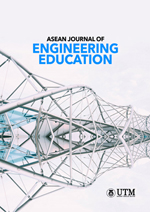Artificial Intelligence Integration For Shaping Future Engineering Education At Higher Colleges of Technology, UAE
DOI:
https://doi.org/10.11113/ajee2025.9n1.193Keywords:
Artificial Intelligence, Engineering Education, Constructivist Learning Theory, TPCK FrameworkAbstract
Artificial intelligence (AI) continues to influence and reshape the field of higher education, offering new opportunities to enhance teaching and learning in engineering programs. This case study examines the integration and impact of AI tools, specifically ChatGPT and MATLAB Simulink, in supporting constructivist instructional approaches within typical undergraduate chemical engineering courses at the Higher Colleges of Technology in the United Arab Emirates (UAE). Grounded in Constructivist Learning Theory (CLT) and guided by the Technological Pedagogical Content Knowledge (TPCK) framework, the study explores how AI tools support student engagement, independence, and deep understanding of complex chemical engineering concepts. Data were collected through two focus group discussions with instructors and students, respectively, and complemented by document analysis of course materials and AI-generated student work. The findings indicate that AI integration contributes to personalized learning, improved academic performance, and increased student engagement. However, the study also identifies significant challenges, including academic integrity concerns, limited technical knowledge among educators and students, students' excessive reliance on AI, occasional inaccuracy of AI-generated content, restricted access to advanced AI tools, and the cost of implementation. These insights highlight both the promise and the challenges of integrating AI into engineering education.



















